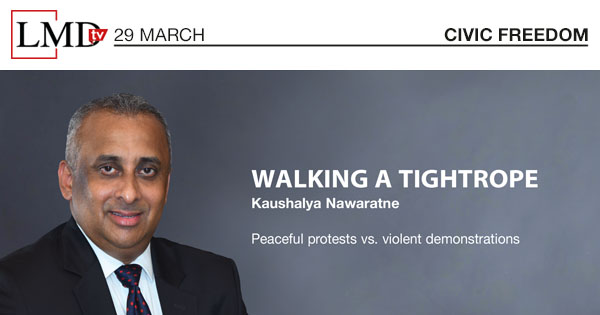Although Sri Lanka has witnessed civil protests throughout its history, there’s been a rapid acceleration in recent times – especially with the mass protests against the government that began in March last year.
In a recent LMDtv interview, the President of the Bar Association of Sri Lanka (BASL) Kaushalya Nawaratne pointed out that protesting is a constitutionally recognised freedom: “Citizens are entitled to engage in peaceful protests since they have the freedom of expression.”
While expressing support for peaceful protests, he discouraged violent demonstrations. “Peaceful protests are an expression of dissent by citizens within the purview of the law,” he explained, adding: “You are entitled to exercise your rights that have been recognised by the law; but you’re not allowed to break the law.”
Noting that the “freedom [to protest] means the absence of any control or restriction by the government,” Nawaratne recalled how protests were interfered with by the armed forces, the police and restrictions imposed by the administration.
“Peaceful practice is one of the main slogans used by citizens all over the world – not only in recent times but for centuries,” he remarked. He stated that in most countries, protests begin peacefully but with the passage of time, they become violent.
The examples he cited included demonstrations in countries and territories such as Iraq, Iran, Hawaii, Pakistan and Japan.
Offering an example of best practice, Nawaratne highlighted what is perhaps the most revered protest in history – the peaceful protest launched by Mahatma Gandhi, which led to India gaining independence from the British.
“There is a very fine line between a peaceful protest and violent demonstration,” he affirmed.
Nawaratne recounted Sri Lanka’s aragalaya last year: “The people began protesting individually – sometimes with their children; they stood outside their gates, held placards, wore black bands and displayed their dissent. Then over time, the government took steps to control the peaceful protests.”
“The moment you try to control and impose certain restrictions, of course the reaction is automatically to become very violent – that’s what happened a year ago,” he asserted.
Adding to this, Nawaratne stressed the need for people to act within the law: “The moment you become violent and break the law, that’s not something that will be encouraged. And then law enforcement authorities – including the police and perhaps the armed forces – will have to intervene, and maintain law and order – because lawlessness is not encouraged by a democratic society where the rule of law is respected and protected.”
He also commented on BASL’s measures to educate stakeholders of law enforcement on citizens’ rights and obligations to guide them in ensuring that people’s voices are heard without the need for them to be violent.
“If you educate citizens correctly, I feel the rule of law can be maintained,” Nawaratne explained, noting that a “lack of knowledge of the subject is dangerous.”
With Sri Lanka being at a crucial point and facing a challenging journey ahead, protests are inevitable. He observed: “People are finding it extremely difficult with the recession in the country so they will most likely come and show their dissent, and that must be respected and heard.”
“Their voices should and shall be heard,” he declared, adding that “if the authorities take unlawful measures to curtail the demonstrations or scuttle and suppress their voices, my opinion is that we should not tolerate it.”
Nawaratne urged the people to respect the law and not take it into their hands: “If you’re to be defended before a court of law, you have to act well within the purview of the law. If you violate the law, you’ll have to be punished.”
“Therefore, whatever the dissent or demonstration you intend doing, [ensure that it’s] done well within the purview of the law,” he surmised.




